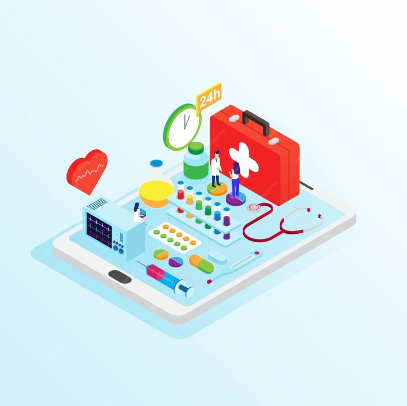
Importance of the medicine delivery App development
In the fast-paced world of today, the importance of technology in the healthcare sector cannot be overstated. Among the various technological advancements, medicine delivery apps have emerged as a game-changer, revolutionizing the way people access medications. This development has brought significant improvements in convenience, efficiency, and accessibility to healthcare services. The following article delves into the critical importance of medicine delivery app development, exploring its benefits, features, and broader implications for the healthcare industry.
Convenience and Accessibility
One of the primary reasons for the rising popularity of medicine delivery apps is the unparalleled convenience they offer. Traditionally, obtaining medications involved visiting a pharmacy, which could be time-consuming and inconvenient, especially for those with busy schedules or mobility issues. Medicine delivery apps eliminate this hassle by allowing users to order their prescriptions and have them delivered directly to their doorstep. This is particularly beneficial for elderly patients, individuals with chronic illnesses, and those living in remote areas where access to pharmacies might be limited.
Enhanced Medication Adherence
Medication adherence is a critical factor in the effectiveness of treatment plans. Non-adherence, whether due to forgetfulness, inconvenience, or other factors, can lead to worsening health conditions and increased healthcare costs. Medicine delivery apps often come equipped with features such as reminders and automatic refills, which help ensure that patients take their medications as prescribed. By facilitating timely and consistent access to medications, these apps play a crucial role in improving adherence and, consequently, patient outcomes.
Time and Cost Efficiency
Medicine delivery apps offer significant time and cost savings for both patients and healthcare providers. For patients, the ability to order medications online and have them delivered saves time and transportation costs associated with visiting a pharmacy. For pharmacies and healthcare providers, these apps streamline operations by automating prescription processing, inventory management, and delivery logistics. This not only reduces administrative burdens but also minimizes the risk of errors in medication dispensing.
Access to a Wider Range of Medications
Local pharmacies may not always have every medication in stock, leading to delays in treatment or the need to visit multiple pharmacies. Medicine delivery apps typically have partnerships with various pharmacies and suppliers, providing access to a broader range of medications. This ensures that patients can obtain even rare or specialized medications without unnecessary delays. Additionally, these apps often provide detailed information about each medication, helping patients make informed decisions about their treatment options.
Improved Patient Engagement
Patient engagement is a cornerstone of effective healthcare delivery. Medicine delivery apps enhance patient engagement by providing a user-friendly platform for managing prescriptions, accessing medical information, and communicating with healthcare providers. Features such as medication tracking, dosage instructions, and educational resources empower patients to take an active role in their healthcare. This increased engagement can lead to better health outcomes and a stronger patient-provider relationship.
Support for Chronic Disease Management
Chronic diseases such as diabetes, hypertension, and asthma require ongoing medication management and monitoring. Medicine delivery apps are particularly beneficial for patients with chronic conditions, as they offer a seamless way to manage multiple prescriptions and ensure timely refills. Some apps also integrate with wearable devices and health monitoring tools, allowing patients to track their health metrics and share this data with their healthcare providers. This holistic approach to chronic disease management can lead to more personalized and effective treatment plans.
Enhanced Data Security and Privacy
Data security and privacy are paramount in healthcare. Medicine delivery apps adhere to stringent regulations and standards to protect patient information. Features such as encrypted data transmission, secure payment gateways, and compliance with healthcare privacy laws (e.g., HIPAA in the United States) ensure that patients’ personal and medical information is safeguarded. This builds trust among users and encourages the adoption of digital health solutions.
Scalability and Integration with Telemedicine
The COVID-19 pandemic has accelerated the adoption of telemedicine, and medicine delivery apps complement this trend by offering integrated services. Patients can consult with healthcare providers via telemedicine platforms and seamlessly order prescribed medications through the same app. This integration enhances the overall patient experience and provides a comprehensive solution for remote healthcare. Moreover, the scalability of medicine delivery apps allows them to serve a growing number of users without compromising on service quality.
Economic Impact and Market Growth
The development and proliferation of medicine delivery apps have significant economic implications. The global market for online pharmacy services is expected to grow substantially, driven by increasing smartphone penetration, rising healthcare costs, and the demand for convenient healthcare solutions. This growth creates opportunities for startups and established companies to innovate and expand their services, contributing to economic development and job creation in the tech and healthcare sectors.
Environmental Benefits
Medicine delivery apps also contribute to environmental sustainability. By reducing the need for physical visits to pharmacies, these apps help decrease carbon emissions associated with transportation. Additionally, efficient inventory management and optimized delivery routes minimize waste and reduce the carbon footprint of pharmaceutical supply chains. As environmental concerns become increasingly important, the role of digital health solutions in promoting sustainability cannot be overlooked.
Conclusion
The development of medicine delivery apps marks a significant advancement in the healthcare industry, offering numerous benefits that extend beyond mere convenience. From improving medication adherence and patient engagement to enhancing access to a wider range of medications and supporting chronic disease management, these apps are transforming the way healthcare is delivered. Their importance is further underscored by their role in ensuring data security, integrating with telemedicine, and contributing to economic growth and environmental sustainability.
As technology continues to evolve, the potential for medicine delivery apps to further revolutionize healthcare delivery is immense. Stakeholders, including healthcare providers, tech developers, policymakers, and patients, must collaborate to harness the full potential of these digital health solutions. By doing so, we can create a more accessible, efficient, and patient-centered healthcare system that meets the needs of a diverse and growing population.


